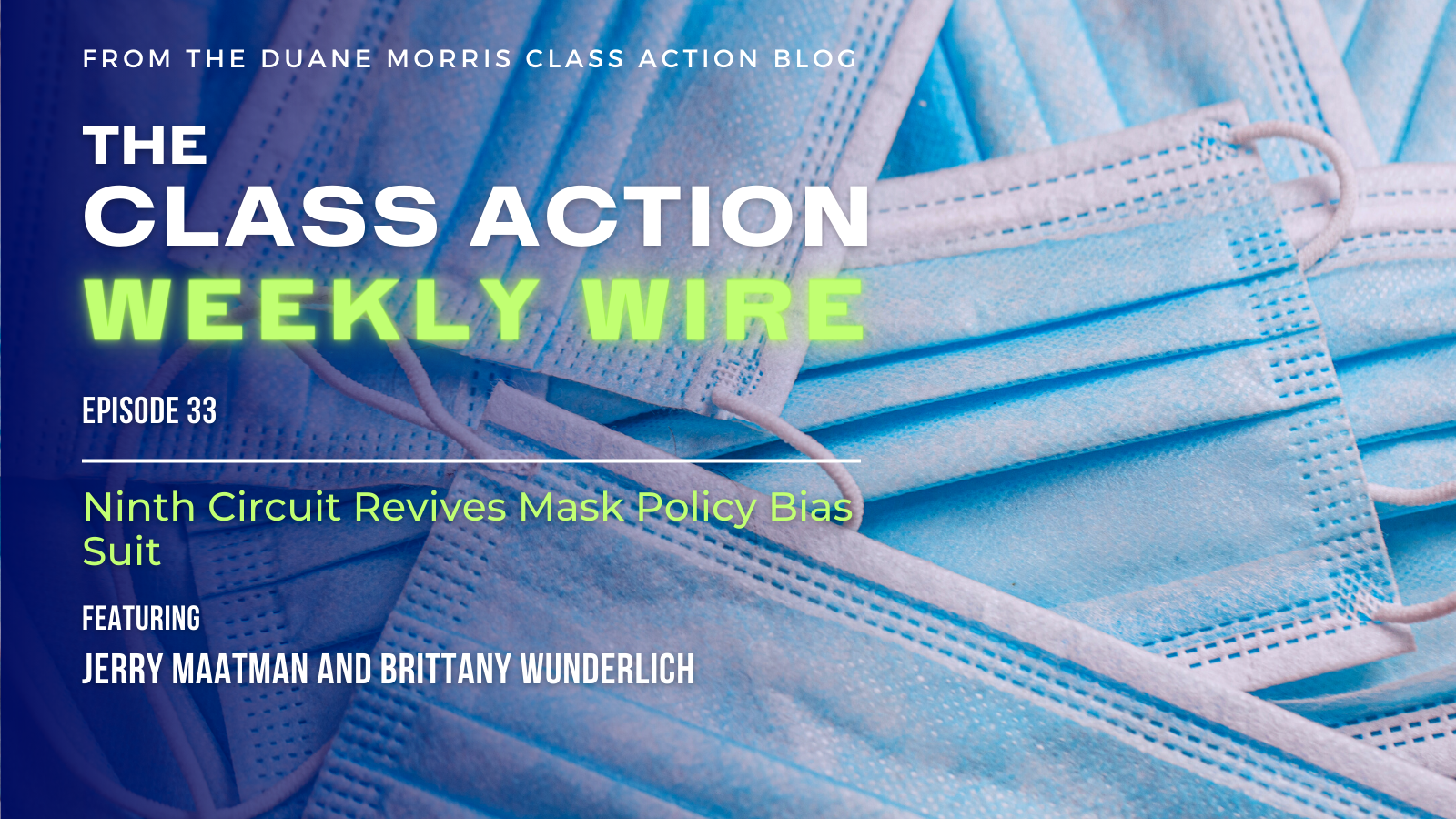 Duane Morris Takeaway: This week’s episode of the Class Action Weekly Wire features Duane Morris partner Jerry Maatman and associate Brittany Wunderlich with their discussion of a Ninth Circuit’s ruling issued this week that reversed United Airlines’ win in a disability bias suit brought a baggage handler under FEHA in California.
Duane Morris Takeaway: This week’s episode of the Class Action Weekly Wire features Duane Morris partner Jerry Maatman and associate Brittany Wunderlich with their discussion of a Ninth Circuit’s ruling issued this week that reversed United Airlines’ win in a disability bias suit brought a baggage handler under FEHA in California.
Check out today’s episode and subscribe to our show from your preferred podcast platform: Spotify, Amazon Music, the Samsung Podcasts app, Podcast Index, Tune In, Listen Notes, iHeartRadio, Deezer, or our RSS feed.
Episode Transcript
Jerry Maatman: Thank you, loyal blog readers welcome to our Friday weekly podcast entitled the Class Action Weekly Wire. Today I’m joined by my colleague Brittany Wunderlich, and we’re going to be talking about issues in California, where Brittany practices law. Welcome, Britney.
Brittany Wunderlich: Thanks, Jerry. I’m happy to be here
Jerry: Today we’re going to talk about a recent ruling from the Ninth Circuit involving Bezzina v. United Airlines. Brittany, what’s this case about? And why is it important to employers in terms of what the Ninth Circuit wrote in this particular case?
Brittany: So, in California to be successful on a disability discrimination claim under the Fair Employment and Housing Act, otherwise known as FEHA, a plaintiff must show 3 things. First, that they suffered from a disability; second, that they were otherwise qualified to do his or her job; and third, that they were subjected to an adverse employment action because of their disability.
Jerry: To me, what makes this case interesting is the disability in question. Could you share with our listeners a little bit about the background facts, and why those facts kind of dictated the result in the Ninth Circuit’s ruling?
Brittany: Absolutely. So, this case was filed by a baggage handler working for United, who alleged that the company would not accommodate his request to wear a face shield while he was working inside rather than a mask, and this was during the height of the COVID-19 pandemic. Specifically, the plaintiff stated that he was a military veteran who suffered from post-traumatic stress disorder, and so wearing a mask caused him anxiety. On the other hand, the defendant argued that the baggage handler’s position was too unpredictable to grant the accommodation, and that, denying the request was a reasonable business decision in response to the global pandemic. The defendant thereafter place the plaintiff on an unpaid leave of absence when he would not wear his face mask, which the plaintiff alleged was an adverse employment action against him because of his disability.
Jerry: This to me is a really interesting case because of the CDC guidelines, which in essence say face masks are the option of choice, and the safest device for presenting preventing the spread of COVID-19, and that only in alternatives should face shields be used. How did the plaintiff’s lawyer litigate that question that issue to get around that problem?
Brittany: Well, at the trial court the district court granted the defendant’s motion for summary judgment. The plaintiff then appealed the decision, and the Ninth Circuit reversed and remanded the case. The Ninth Circuit stated that the issue of whether the plaintiff’s request was reasonable should be for a jury to decide. The Ninth Circuit also reasoned that a jury could find that the plaintiff was able to perform the essential job duties while wearing a face shield and without endangering the health and safety of others. The Ninth Circuit then stated that the question of whether placing the plaintiff on an unpaid leave of absence was an accommodation, or instead an adverse employment action was an unresolved, disputed fact.
Jerry: Very interesting to me. One thinks that the COVID-19 pandemic is over, but the legal disputes are still in the courts still ripe and very interesting outcomes. I think it proves the old adage that every ADA case is different, and rises and falls on the individual circumstances of the plaintiff. Well, Britney, thanks so much for sharing your thought leadership and expertise looking at that. Thanks so much for being a guest on the Class Action Weekly Wire.
Brittany: Thanks, Jerry. It’s nice being here, and thanks to all your listeners.
